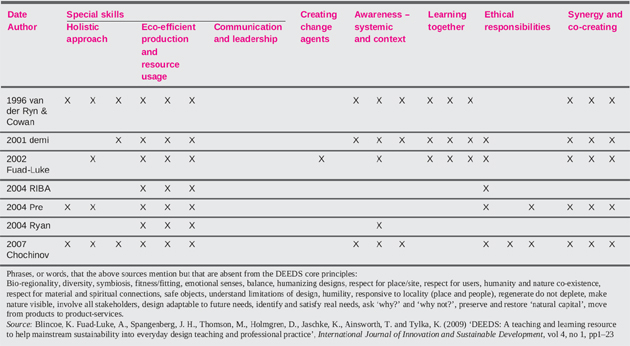The DEEDS Core Principles
This is a set of interrelated principles to guide designers in their thoughts and actions in ‘designing for sustainability’. The principles were developed between November 2006 and July 2007 and underwent several iterations. They were published on the DEEDS website, www.deedsproject.org, in November 2007, and formally at the Changing the Change conference in Turin in July 2008, www.changingthechange.org. An overview of the DEEDS project is to be published in the International Journal of Innovation and Sustainable Development in early 2009.
The principles are the most comprehensive manifesto for change published in the past 30 years (see Table A1) based around six themes under the acronym ‘SCALES’, including two new themes not previously addressed – ‘Special skills around communication and leadership’ and ‘Creating change agents’. The principles are a call to designers to take hold of the sustainability agenda and to inspire, lead and catalyse positive change. SCALES offers a most comprehensive set of criteria that:
• embraces the scope of previous criteria yet adds new ones found to be essential when understanding design for sustainability (DfS) as a broader challenge than design for the environment (DfE)
• can be easily adapted and ‘owned’ by an individual or a group, initiating a process of learning by doing
• can form a reference point to demonstrate how case studies embed the principles
• allows for each principle to become the basis of a teaching module and/or an example case study
• provide a philosophical and practical foundation for a pluralistic approach to developing DfS teaching and learning (T&L) pedagogy and practical tools serving as a benchmark.
The Core Principles – SCALES
Design for sustainability is a life journey & that expands the context of your design life:
Special skills – holistic approach
(S 1) Develop new skills for recognizing, framing (looking for systemic connections) and solving problems
(S 2) Define problems holistically by systems and life cycle thinking, combined with appropriate technical and social innovation
(S 3) Analyse problems from multiple perspectives, including the four sustainability dimensions – economic, social, institutional and environmental – but not forgetting human dimensions too (mental, physical, emotional and spiritual)
Special skills – eco-efficient production and resource usage
(S 4) Develop LCT, LCA and ‘cradle to cradle’ skills, be familiar with technology know-how and appropriate application of light-weighting (materials reduction), renewables/new materials, extended product lives, reusability and recyclability (designing ‘quality waste’), waste avoidance, energy issues and dematerialization (moving from products to dematerialized services)
(S 5) Integrate efficient service provision in design solutions, by designing product- service systems, products suitable for sharing and pooling, pay per use or per experience
(S 6) Maximize consumer satisfaction per service enjoyed by addressing human needs; consider different material and immaterial options to do so and choose the most sustainable one; design fertile products offering users’ experience, emotion, relation, pride, self-esteem and awareness
Special skills – communication and leadership
(S 7) Lead the agenda – develop leadership skills
(S 8) Tell engaging stories – develop presentation, narrative and scenario-setting skills
(S 9) Forge new visions of enterprise – understand economic thinking without adopting it (know the language, but do not have the mindset of business)
Creating change agents
(C 1) Expand your context – be aware that the sustainability context expands the design context in thinking and practice
(C 2) Change perceptions – by making use of the diversity of ‘value-added’ outcomes of design for sustainability DfS
(C 3) Set new aspirations – practice DfS approaches that provide significant, immediate and visible benefits to encourage consumers to aspire to a new, sustainable cultural representation of the ‘good life’
Awareness – systemic and context
(A 1) Be aware of context and connections (people, planet, prosperity; key drivers and timeframes)
(A 2) Be aware of positive and negative impacts, feedback loops and side effects in this context
(A 3) Be aware of choice and responsibility under these circumstances
Learning together
(L 1) Seek to work with other disciplines – practice inter- and trans-disciplinary thinking and practice
(L 2) Be a teacher-learner – practice mutual learning, creativity and team working, understand sharing ideas as a way to stimulate creativity
(L 3) Participate with your peers – practice T&L through participation, involving an extended peer community of relevant stakeholders
Ethical responsibilities
(E 1) Develop design that does no harm (responsible design, with integrity), but contributes to a sustainable way of a ‘good life’, long term and globally, also if applied in mass production
(E 2) Create genuine consumer empowerment – offer design that enhances personal standing and acceptance, and thus social sustainability and encourages user involvement (consumer empowerment)
(E 3) Focus on experiences not objects – develop practical, functional and fun design that deepens life experiences and strengthens personal and social cohesion
Synergy and co-creating
(Sy 1) Activate through participation – promote the development of teams, communities and networks
(Sy 2) Engage in synergistic clusters of competence
(Sy 3) Practice collaboration, sharing and partnering, and the involvement of stakeholders in the problem definition and the solution design process
Table A1 Comparison of DEEDS core principles with previously published green design, eco-design, ecological and sustainable design systematiques



